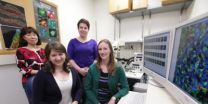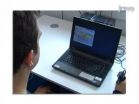(Press-News.org) Patients with terminal forms of leukaemia and lymphoma who have run out of treatment options could soon benefit from a new drug, which not only puts an end to chemotherapy and has virtually no side effects but also improves a patient's life expectancy and quality of life.
It has been described as a breakthrough in cancer treatment by a leading professor in haematology, who presented the findings of the Phase 1 trial at an international conference in New Orleans in December 2013.
Professor Simon Rule, Consultant Haematologist at Plymouth Hospitals NHS Trust and researcher at Plymouth University Peninsula Schools of Medicine and Dentistry, has led the first worldwide study of its kind into a new class of BTK (Bruton's Tyrosine Kinase) inhibiting drugs at Derriford Hospital in Plymouth, describes it as 'exciting' and 'a transformation' in the treatment for patients with these conditions.
Professor Rule has observed significant improvements in his patients. The first four patients in the world to receive this drug were treated in Plymouth, starting in September 2012. Since then, more than 30 patients worldwide are receiving this treatment, with positive results.
Professor Rule said: "The astonishing thing about these drugs is that they have virtually no side effects, which is unprecedented from my experience. In some patients the effects are immediate. Patients with lots of symptoms, particularly those with lymphoma, will feel better the next day after taking the medication.
"The UK is at the forefront of this drug development and all of the studies into these drugs are being run from Plymouth. This will completely change the way we manage these diseases. We have access to the next generation of the drug to be part of the next trial phases. This is not a cure for cancer but it will mean we are significantly improving our patients' life expectancy and quality of life; similar to managing a chronic condition. I have yet to come across another class of drugs in my career that has been so successful for leukaemia or lymphoma."
Current therapies, such as chemotherapy, intensive chemo-immunotherapy (chemotherapy combined with immunotherapy) or stem cell transplant are effective but due to the aggressive nature of these cancers, patients always relapse and eventually run out of options.
These drugs work by inhibiting Bruton's tyrosine kinase (BTK), a protein which plays a role in the signals that cause growth in cancerous cells. Blocking this causes the cancerous cells to die but normal cells are unaffected.
With an average survival rate of four to five years, the new developments in BTK inhibiting drugs could dramatically improve the life expectancy and quality of life for patients with terminal forms of leukaemia and lymphoma who have run out of other treatment options.
David Hodge, 74, from Plymouth, was the first in the world to be treated with this new medication and more than a year on from the start of the trial is feeling the benefits.
Prior to starting the trial in September 2012, David had only several months to live. This was due to his immune system not functioning and also following years of treatment he had become resistant to all other treatments.
Professor Rule continued: "To be brutal, David had no other option. He was resistant to other forms of treatments so I am just pleased to have been able to access this drug and offer it to him."
When asked whether this was the outcome he imagined the trial to have a year ago, Professor Rule said: "I have done a lot of drug trials in my career; this drug and its predecessor, which I was fortunate to be the first person in Europe to use - they are transformational as far as I am concerned.
"So, did I expect this to happen? No, but I was hopeful that this drug would be more effective than similar drugs we could trial.
"Normally what you expect with trials like this is that you treat a patient for a period of time and often what happens is the drug doesn't work; the side effects make you stop the trial or the disease doesn't respond for very long. What is very exciting about this drug is the effects are continuing and there are no emerging side effects."
Professor Rule is now planning to run a UK study from Plymouth using the latest BTK drug in a trial against standard chemotherapy.
"The next stage will be chemo-free treatment. We've been talking about it for years and now it might be a reality," he explains. "This has the very real prospect of changing the management of these difficult forms of cancer."
Professor Simon Rule runs the only mantle cell lymphoma clinic in Europe, with one other clinic in America. As a leading clinician in mantle cell lymphoma, patients have come from around the world to seek out Professor Rule's expertise.
David Hodge's Story
David Hodge, 74, from Plymouth, was the first person in the world to be treated with this new medication and 12 months on from the start of the trial is feeling the benefits.
Prior to starting the trial in September 2012, David had only several months to live. This was due to his immune system not functioning and also following years of treatment he had become resistant to all other treatments.
Speaking on the first day of starting to take the BTK drug in September 2012, David explained what it meant to him to be taking part in the trial: "I've had three treatments, one chemo and two other treatments and although I've now had CLL (chronic lymphocytic leukemia), for 17 years, which is remarkable really, of course life is very precious and if my life can be extended I'd give God the thanks for that.
"I think with any new trial or drug, or with chemotherapy there's a little bit of trepidation but I'm a Christian and I prayed about this and I got great peace about it. I just felt, even if it proves at this moment, to be of little use to me; I trust that with 'fine tuning' it will prove to be significant to those taking the drug later on."
On the first night David stayed in hospital and has returned for regular check-ups and telephone calls with the nursing team, who have been on hand 24/7.
Meeting up with him one year on from his treatment and he is doing remarkably well. We asked him how he felt when Professor Rule had said he had a drug for him to try. He told us: "Extremely grateful. Quite frankly, I wasn't as aware, as I am now, how critical my situation was and that this really was the only way out. Had I have known, I would have been more concerned but I am really grateful for this opportunity."
David describes how he's had no problems at all with the drug.
"It's just like, well it's better than taking paracetamol. I take the medication first thing in the morning at 6 'o' clock and then go back to bed for an hour. Afterwards I get up and get on with my day; I'm fighting fit. I've had no problems, no side effects, nothing."
David added: "I'm delighted with Birch Ward and the haematology department here because they really are top professionals, I'm completely confident in what they're doing and I'm quite happy to continue with the trial."
INFORMATION: END
Chemo-free treatment a possibility for leukemia/lymphoma
2014-03-19
ELSE PRESS RELEASES FROM THIS DATE:
Neuroscience 'used and abused'
2014-03-19
Influential policy-informing 'evidence' that children's brains are irreversibly 'sculpted' by parental care is based on questionable evidence.
The researchers warn that the success that advocates of 'brain-based' parenting have had in influencing government policy could undermine parent-child relationships.
The study identified that although there is a lack of scientific foundation to many of the claims of 'brain-based' parenting, the idea that years 0-3 are neurologically critical is now repeated in policy documents and has been integrated into professional training ...
NRL researchers detect water around a hot Jupiter
2014-03-19
Scientists at the Naval Research Laboratory (NRL) are part of a research team that has detected water vapor in the atmosphere of a planet outside our solar system. The team, including scientists from California Institute of Technology, Harvard-Smithsonian Center for Astrophysics, Pennsylvania State University, and University of Arizona, applied a sophisticated Doppler technique to the infrared to directly detect the planet and demonstrate the presence of water in its atmosphere. The discovery is described in the March 10, 2014 issue of The Astrophysical Journal Letters.
The ...
Vanderbilt diabetes researchers track cells' ability to regenerate
2014-03-19
Vanderbilt University scientists have found evidence that the insulin-secreting beta cells of the pancreas, which are either killed or become dysfunctional in the two main forms of diabetes, have the capacity to regenerate.
The surprising finding, posted online recently by Cell Metabolism, suggests that by understanding how regeneration occurs, scientists one day may be able to stop or reverse the rising tide of diabetes, which currently affects more than 8 percent of the U.S. population.
The study "provides clues to how we might learn what signals promote beta-cell ...
Critical illness increases risk of psychological problems
2014-03-19
Fortunately, more and more people survive critical illnesses and accidents. A new Danish-American survey shows, however, that hospitalisation where the patient has received mechanical ventilation can have serious consequences:
- Of course, the good news is that more and more patients survive critical illness and treatment using ventilators. But at the same time, the bad news is that we have now documented that the ventilator patients have a considerable risk of developing psychological problems.
The first few months after discharge are really critical, says professor ...
Multidisciplinary research team led by Tufts CTSI proposes new model for clinical trials
2014-03-19
BOSTON (March 19, 2014) – Experts across academia, industry and government propose a new method for health care providers to get the right treatments to the right patients at the right time. This new approach, A Proposal for Integrated Efficacy-to-Effectiveness (E2E) Clinical Trials, published in Nature Clinical Pharmacology & Therapeutics, recommends a seamless transition from controlled experiments to real-world comparative effectiveness trials. This continuum will improve the accuracy of treatment selection and better determine how those treatments work on different ...
Lied-to children more likely to cheat and lie
2014-03-19
People lie – we know this. People lie to kids – we know this, too. But what happens next? Do children who've been lied to lie more themselves?
Surprisingly, the question had not been asked experimentally until Chelsea Hays, then an undergraduate student in psychology at the University of California, San Diego, approached professor Leslie Carver with it. Now the pair have a paper out in Developmental Science, suggesting that adult dishonesty does make a difference, and not in a good way.
"As far as we know," said Carver, associate professor of psychology and human development ...
Small step towards growing tissue in the lab
2014-03-19
University of Adelaide mathematicians have devised a method for identifying how cell clusters have formed by analysing an image of the cluster.
Published in the Journal of Theoretical Biology, their mathematical modelling tool will be useful in helping biologists and tissue engineers to move towards growing human tissue such as liver in the laboratory.
"When any tissue or organ develops, the cells have to organise themselves into the correct structure," says Dr Edward Green, researcher in the University's School of Mathematical Sciences. "This self-organisation process ...
Ancient DNA shows moa were fine until humans arrived
2014-03-19
A study by Curtin University researchers and colleagues from Denmark and New Zealand strengthens the case for human involvement in the disappearance of New Zealand's iconic megaherbivore, the moa - a distant relative of the Australian Emu.
All nine species of New Zealand moa, the largest weighing up to 250 kilograms, became extinct shortly after Polynesians arrived in the country in the late 13th century.
Researchers have previously suggested, from limited genetic evidence, that huge populations of moa had collapsed before people arrived and hence influences other ...
No-refrigeration, spray vaccine could curb diseases in remote areas
2014-03-19
DALLAS, March 19, 2014 — A new kind of single-dose vaccine that comes in a nasal spray and doesn't require refrigeration could dramatically alter the public health landscape — get more people vaccinated around the world and address the looming threats of emerging and re-emerging diseases. Researchers presented the latest design and testing of these "nanovaccines" at the 247th National Meeting & Exposition of the American Chemical Society (ACS), the world's largest scientific society.
Their talk was one of more than 10,000 presentations at the meeting, being held here ...
Understanding binge eating and obesity
2014-03-19
VIDEO:
In this JoVE video article, a set of methods to measure food-related motivation and values are described in JoVE's peer-reviewed video article format.
Click here for more information.
March 19, 2014 —Researchers at the University of Cambridge have developed a novel method for evaluating the treatment of obesity-related food behavior. In an effort to further scientific understanding of the underlying problem, they have published the first peer-reviewed video of their technique ...



